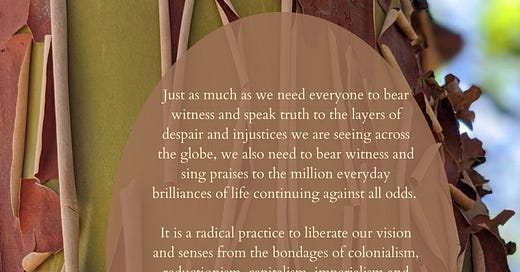Just as much as we need everyone to bear witness and speak truth to the layers of despair and injustices we are seeing across the globe, we also need to bear witness and sing praises to the million everyday brilliances of life continuing against all odds.
It is a radical practice to liberate our vision and senses from the bondages of colonialism, reductionism, capitalism, imperialism and anthropocentrism. To rehydrate and reclaim
our kinship vision, our kinship senses.
The Earth and all of our kin are singing songs to call you home.
Stop and listen to them in countless
love poems all around us.
Western science observation is all about objectivity and seeks to remove humans out of the landscape and ecosystem; while ironically creating a devastatingly anthropogenic impact born of disconnection.
An Indigenous lens of traditional ecological knowledge embodies relationality and includes us as part but not the center of the whole landscape of interdependence.
Reverent curiosity practice strengthens our lens of being of place; of belonging and honoring the multitudes of kinship strands that weave us into reciprocity with the world around us.
This practice of relational presencing is for all of us wanting to participate in cultures of transition to birth a vibrant future, to rehydrate our kinship vision.
I find getting small and low to the ground helps catalyze a different perspective and stirs my reverent curiosity.
Let’s sit here for a second with these kin. What curiosities, questions arise when we sit here and look from this perspective?
What interconnectedness are we bearing witness to?
What is needed to cultivate this kind of reverent curiosity approach to the world, to myself, to others. How would it be to approach the timid, wild, or wounded parts of ourselves with reverence and curiosity rather than judgment? What would happen if we looked at each other and the world more regularly from the place of openness, curiosity and awe? How can we strengthen these muscles of interdependence, and how we see ourselves in relationship to the world around us?
How do these inner practices help ripple out into larger social and cultural change?
How might we heal fractured worldviews with intimate immensities such as a daily practice of reweaving the relationality of the world back together inside ourselves and the way we see the ourselves in the world?
Reverent Curiosity is a superpower. It is written in your blood and your bones, waiting for you to sit quietly and tend to this bubbling wellspring. It is part of how we will stitch the tapestry of memory back together to remember our way forward.
It will help us birth the new world the children are waiting for.







Interconnectedness is like pulling a thread on a sweater to me - once you start unraveling it, it keeps going, revealing more and more! We gathered with friends last weekend to Wassail our orchard and our neighbour's, thank the apple trees, and brainstorm on how we can use our skills to help our community through difficult times. There is some version of this available to all of us. Thank you for the lovely writings.
Thank you for this profoundly beautiful offering. The way you describe reverent curiosity and kinship vision as a radical practice resonates deeply. Reclaiming relationality—with land, kin, and all living beings—feels like an essential act of resistance and healing in a world shaped by colonial-capitalist fragmentation. What you’re describing isn’t just a practice; it’s a reorientation of being—one that reminds us we were never separate to begin with.
In my work on trauma studies, I’ve been exploring how coloniality and capitalism impose a fractured, isolated way of being that severs us from connection—both with others and within ourselves. This disconnection isn’t just metaphorical; it’s a form of structural and generational trauma. I’m curious how you see this practice of reverent curiosity and relational presence in relation to trauma—especially the kind of trauma that arises from being forcibly disconnected from land, community, and self.
What happens when we approach trauma as something relational—not something to "fix" in isolation, but a wound that can only be tended to through kinship, reciprocity, and connection? How might practices like getting low to the ground, softening into awe and curiosity, help us reweave fractured worldviews within ourselves?
I also love your question about how these practices ripple outward into larger social change. I’d be so interested to hear your thoughts on how individual practices of relational healing might scale into collective movements that help us navigate the deep transformations we’re facing. Thank you for inviting us into this conversation. It feels like a breath of fresh air in a world that so often pushes us to "solve" rather than to be with, listen, and remember.